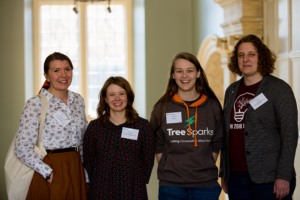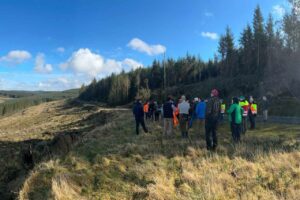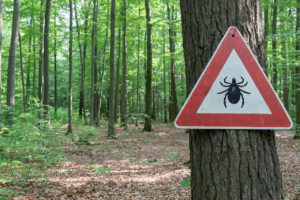
Collaboration between foresters and arboriculturists and others such as scientists, conservationists and environmentalists is the future for forestry, creating a new smart outlook that also embraces and encourages the next generation, the ICF’s National Conference in Oxford heard.
Frances Seymour, Distinguished Senior Fellow at the World Resources Institute, explained that the UK’s leadership in conserving tropical forests is appreciated on a global scale with the UK highlighting illegal logging on the international agenda as early as 1998 and warning that it was no coincidence that the destruction of tropical forests was happening at the same time as a vast increase in in the amount of carbon dioxide entering the atmosphere.
She explained that there is considerable optimism for the future as there is evidence that reforestation is feasible and affordable at a time when the global view is shifting towards forest protection. She pointed out that global consensus on United Nations REDD+ programme has been reached and it is the finance that now needs to be put in place.
Berry Wiersum, Chief Executive Officer of Sappi Europe, spoke about the role of the consumer and how the move towards eliminating single-use plastic in many countries will lead to a rise in demand for timber as many of the replacements in terms of packaging, in particular, derive from wood and it is inevitable that the price of timber will rise.
As a result Governments and decision makers, increasingly conscious that ‘forests are the most efficient carbon sink’, will push for more trees to be planted as by planting more trees they are not only working toward climate change goals but also providing trees for future demand.
The conference heard that foresters as a whole are not very good at marketing the valuable work they do and the value of trees in terms of carbon capture, positive effects on communities, well-being and the economy. Luis Neves Silva of WWF suggested that plantations are the way forward but done in a way that new trees are combined with local needs and landscaping and communities are part of the scheme.

He said the choice of species and the way planting is landscaped are vital, creating precision ‘smart’ forestry, an approach that could work well in the UK but will require a greater level of planning when it comes to decision making and stakeholder engagement with collaboration across agencies.
Alexander Buck, Executive Director of the International Union of Forest Research Organisations (IUFRO) argued that scientists also need to be part of that collaboration in terms of sharing knowledge so that scientific solutions can be used to benefit forests, trees and communities around the world. He explained that IUFRO acts as ‘an honest broker’ to provide stakeholders and decision makers with robust scientific evidence and options for effective action.
Professor Colin Galbraith said that the UK has an important role in taking a lead. When it comes to forestry this includes sustainable harvesting models, dealing with pests and disease, limiting large scale clear felling, minimising the impact on native species and combining commercialisation with conservation, water management, wildlife protection and carbon capture.
Following on from this Tony Juniper, speaking as an environmentalist and author, but soon to be chair of Natural England, argued for more collaboration between foresters, conservationists and environmentalists. He said it is time for the ‘clash of cultures’ to end.

Looking ahead to the future several young speakers gave a glimpse of how to encourage the next generation of foresters. Lacey Rose, a registered professional forester in the County of Renfrew in Ontario, Canada, said that young people need encouragement. She takes every chance that she can to go into schools and talk about the opportunities available in forestry. She highlighted the importance of having a mentor and she urged people to take the time to share their knowledge as not everything can be learned from a book.
Jemima Letts, an ICF Student Member and a final year forestry undergraduate at the University of Bangor, admitted that her friends thought she was ‘mad’ looking to forestry as a career and a lack of awareness and understanding of forestry and the careers available means they are not promoted.
Lisa Prior, Vice President of the International Forestry Students’ Association (IFSA), told the conference about the importance of students taking learning beyond the classroom and also of networking on a global scale. Like Lacey, she believes in a strong relationship between young professionals starting out in their career and those with senior experience, with mentors being a key part of this. She praised the ICF for including so many young people in the conference in terms of chairing sessions and speaking.






